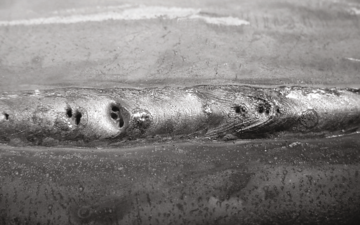Porosity in Welding: Identifying Common Issues and Implementing Best Practices for Prevention
Porosity in welding is a prevalent concern that usually goes unnoticed until it triggers significant troubles with the honesty of welds. This common defect can endanger the toughness and durability of welded frameworks, positioning security dangers and leading to expensive rework. By comprehending the source of porosity and applying reliable prevention techniques, welders can dramatically boost the quality and integrity of their welds. In this conversation, we will check out the key variables adding to porosity formation, analyze its destructive effects on weld efficiency, and review the very best techniques that can be adopted to minimize porosity incident in welding procedures.
Usual Root Causes Of Porosity

Utilizing unclean or damp filler materials can introduce pollutants right into the weld, adding to porosity concerns. To minimize these usual causes of porosity, complete cleaning of base metals, proper protecting gas selection, and adherence to optimal welding parameters are necessary practices in achieving top quality, porosity-free welds.
Effect of Porosity on Weld Quality

The existence of porosity in welding can considerably compromise the structural integrity and mechanical homes of bonded joints. Porosity produces gaps within the weld metal, deteriorating its total strength and load-bearing capacity.
One of the main consequences of porosity is a decrease in the weld's ductility and sturdiness. Welds with high porosity levels tend to show lower effect stamina and reduced capability to deform plastically before fracturing. This can be specifically concerning in applications where the bonded elements are subjected to dynamic or cyclic loading conditions. Porosity can restrain the weld's capability to efficiently transmit forces, leading to early weld failing and prospective safety threats in important structures. What is Porosity.
Finest Practices for Porosity Prevention
To boost the architectural integrity and high quality of bonded joints, what specific steps can be executed to minimize the incident of porosity during the welding procedure? Porosity prevention in welding is important to guarantee the stability and toughness of the final weld. One efficient method is proper cleaning of the base metal, getting rid of any kind of impurities such as rust, oil, paint, or moisture that could lead to gas entrapment. Guaranteeing that the welding equipment remains in great problem, with tidy consumables and proper gas flow rates, can likewise substantially reduce porosity. Furthermore, maintaining a steady arc and controlling the welding criteria, such as voltage, current, and take a trip rate, assists produce go right here a constant weld pool that lessens the danger of gas entrapment. Making use of the proper welding method for the particular product being bonded, such as adjusting the welding angle and gun setting, can further protect against porosity. Routine assessment of welds and prompt removal of any type of issues identified during the welding procedure are essential techniques to avoid porosity and create high-quality welds.
Relevance of Proper Welding Strategies
Applying proper welding methods is paramount in making certain the structural stability and top quality of welded joints, developing upon the structure of efficient porosity avoidance actions. Extreme warm can lead to increased porosity due to the entrapment of gases in the weld pool. Furthermore, making use of the ideal welding criteria, such as voltage, present, and take a trip rate, is crucial for attaining audio welds with marginal porosity.
Moreover, the choice of welding procedure, whether it be MIG, TIG, or stick welding, should align with the specific needs of the task to guarantee optimum results. Correct cleaning and preparation of the base metal, along with picking the best filler product, are likewise important components of competent welding techniques. By sticking to these best methods, welders can lessen the danger of porosity formation and create top notch, structurally audio welds.

Checking and Quality Assurance Steps
Quality control actions play a crucial role in validating the stability and dependability of welded joints. Testing procedures are vital to spot and prevent porosity in welding, making sure the strength and sturdiness of the final product. Non-destructive screening techniques such as ultrasonic screening, radiographic screening, and visual inspection are generally used to determine potential problems like porosity. These strategies enable the assessment of weld quality without jeopardizing the honesty of the joint. visit site What is Porosity.
Post-weld assessments, on the other hand, evaluate the final weld for any type of issues, including porosity, and validate that it meets defined standards. Applying an extensive top quality control strategy that consists of extensive screening treatments and evaluations is vital to minimizing porosity issues and making certain the general quality of bonded joints.
Final Thought
Finally, porosity in welding can be an usual concern that impacts the quality of welds. By determining the common root causes of porosity and implementing ideal practices for prevention, such as correct welding techniques and testing measures, welders can make certain top quality and trusted welds. It is essential to focus on prevention techniques news to minimize the occurrence of porosity and keep the integrity of welded frameworks.